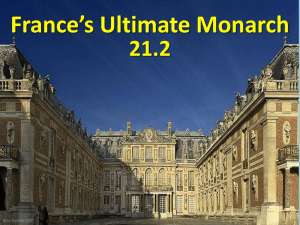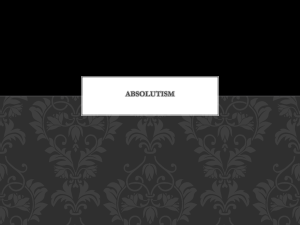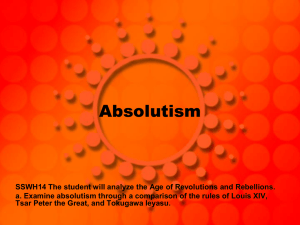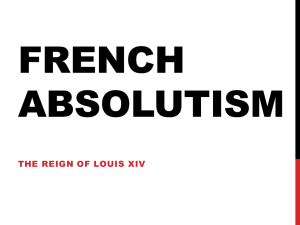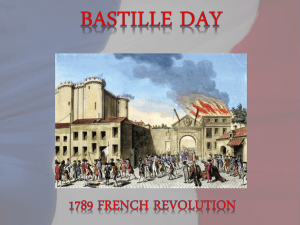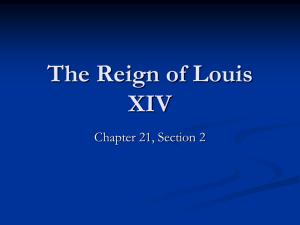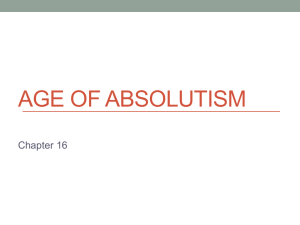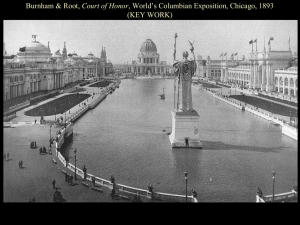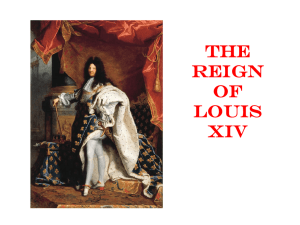Document
advertisement
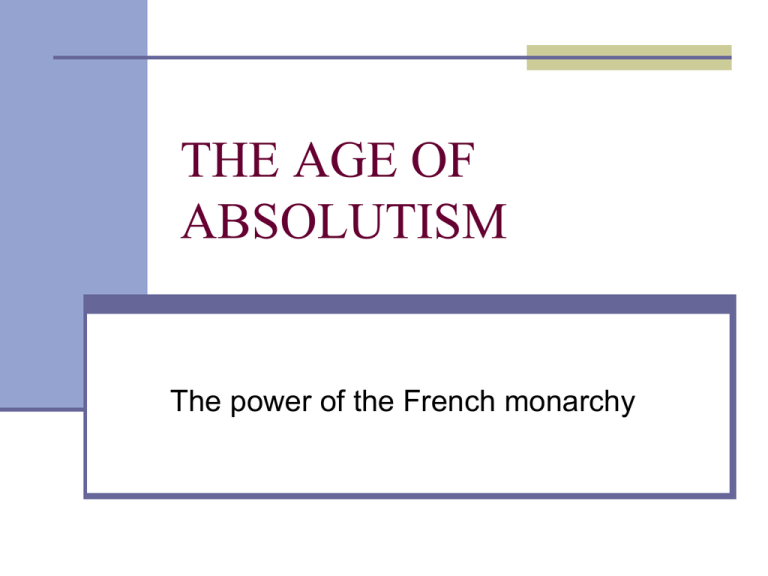
THE AGE OF ABSOLUTISM The power of the French monarchy Absolutism After the Thirty Years’ War, France became the predominant power in Europe. As with the Renaissance, Reformation and Scientific Revolution; Absolutism was a revolution in politics. Absolute rule A ruler that practiced Absolutism believed that he/she ruled by Divine Right: that God had chosen him/her to rule and he/she was only answerable to Him not parliaments or other representative bodies. The ruler controlled all aspects of the government and church in their country. The most important factor for an absolute ruler was to control the nobility of his country as they could be the most dangerous to his rule. Absolutism and War Absolutism change how wars were fought. Prior to this, rulers raised temporary armies comprised of soldiers raised from feudal lords. When the war was over the soldiers would return to their regular jobs. Relying on the nobility for military support was risky: internal strife could result if the nobility decided to withhold support and challenge the monarchy. Absolute monarchy avoided this problem by creating standing armies where a person’s sole job was to be a soldier in service to the monarch. Absolute rulers were the living embodiment of the state. Nowhere is this best illustrated than through the reign of Louis XIV. The Foundation of Absolutism in France Absolutism in France began with Louis XIV’s father, Louis XIII and his chief adviser, Cardinal Richilieu. Richilieu was the one who laid the foundation for absolutism while Louis XIII was still a child. As his regent, Richilieu worked to secularize the country. Even though he was a Catholic priest, Richilieu’s first loyalty was to the crown of France. Louis XIII Things Richilieu did to create French Absolutism Challenged and alienated the French nobility 1. Leveled castles, crushed conspiracies Divided the country into 32 districts with controlling royal indentant in order to weaken the power of the regional nobility 2. • Indentants were: drawn from upper middle class and minor nobility; given extensive powers justice, police and finance; appointed directly by the crown to ensure loyalty and that royal orders were followed Cardinal Richilieu Louis XIV is left alone Both Cardinal Richelieu and Louis XIII died in the same year. Since Louis was still very young another regent was appointed – Mazarin. Mazarin attempted to ease the financial problems of the crown by increasing taxes. This caused a civil war called the Fronde. Louis XIV Mazarin La Fronde This civil war was between the monarchy and disgruntled nobles fed up with their treatment under Louis XIII. The Fronde lasted for 12 years and had a lasting impact on Louis XIV who determined that the only way to prevent chaos was absolute monarchy. “La Fronde” le Comte Louis XIV – The Sun King of France Louis XIV took control of the French throne at age 23 and immediately began to centralize control of the country. His first step was to overhaul his military. With this new style of warfare, France was able to dominate European politics for decades. Other European countries were forced to copy this new military system. Louis XIV – Military Reforms Created a standing army and appointed a secretary of modern to modernize it. Took personal command of the army and directly supervised the military Army was professional and trained in the art of warfare Soldiers no longer lived off the land. Officers in charge of feeding troops Ambulance corps created to look after the wounded Uniforms and weapons were standardized System of training, recruitment, discipline and promotion created Effects of Military Reforms With this new style of warfare, France was able to dominate European politics for decades. Other European countries were forced to copy this new military system. Louis XIV and government Louis also took control of the government of France during his reign. At the time, the day-to-day governing of France was done by three councils: the Court of State the Court of Finances the Court of Dispatches (administered by French law) Louis presided over all three councils and met with all high government officials at least once a week. These actions gave Louis absolute control of the government. Government continued… To ensure that his government employees were loyal, Louis took the following steps: 1. 2. Used bribery to ensure provincial governors loyal to him were elected Reduced provincial governor terms from 5 to 3 years (in case they were not loyal they would not be able to cause too much damage) Louis and laws Louis also insisted that all laws be approved by him before becoming official. Louis staffed government bureaucratic offices with upper middle class people. This robbed the nobility of the traditional political powers. These middle class professionals were paid a salary by the government and were loyal to the monarchy. Louis and the Church Louis’ efforts to centralize power in France inevitably led to conflict with the Catholic Church. The Church insisted that it be supreme over the monarchy. In 1682, Louis answered by stripping the papacy of all its power in France. He eventually annulled the laws but had made his point: the Church would never again issue Church laws dealing with French social, political or financial issues. Louis committed to make religious reforms by revoking the Edict of Nantes removing religious freedom in France. This decision was not made out of religious intolerance but to unite the Church and state under the king’s leadership. Colbert’s Economic Reforms Colbert developed a system for the government to regulate the economy called mercantilism. This system was based on the idea that a country’s international power depended on the country being self-sufficient. To accomplish this, Colbert encouraged many new domestic industries (silk, cotton, etc…) and discouraged importing goods which would have put money in other country’s coffers. Colbert Colbert continued… During Colbert’s tenure as the controller-general of France, he was responsible for the creation of a powerful merchant marine to ensure France’s exports were greater than its imports. These ships took finished goods to its new colonies around the world including Canada and the Caribbean and returned with raw materials to make more exportable goods. French colonization was greatly encouraged by Colbert. However, these colonies were not encouraged to self-sufficiency rather they were potential markets for finished French goods and a source of raw materials. Colbert’s domestic policy Colbert’s domestic policy was to generate more money for the French treasury. To do this, he lowered income tax for the wealthy and increased indirect taxes on things like road tolls, milling and shipping taxes. This policy put the tax burden on the poor. Colbert’s reasoning was that if rich had more money they would spend it on more French goods thereby helping the economy. Palace of Versailles Louis XIV created the palace as a symbol of his power as absolute monarch. Constructed outside the town of Versailles, the palace took 20 years to complete and used the latest and most expensive styles. The palace contained marble and gold carvings, elaborate tapestries, manicured gardens and the latest sculptures and paintings. French artists and intellectuals were always welcome at the Palace. Versailles continued… Louis used this palace as a means of controlling high level nobles. Other European countries envied the Palace and it was the goal of every French noble to live there which Louis used a controlling tool. Nobles would surrender power to him for pensions or invitations to live at the Palace. Louis XIV’s Legacy By the time of Louis’ death in 1715 France was a powerful nation-state. The Catholic Church and the feudal nobles had surrendered most of their power to the monarchy. France was seen as the military and cultural leader of Europe and the people of France had a strong nationalistic pride. France also had developed a strong empire of colonies to use for resources and to sell its finished goods. However, not all was perfect in France… One problem still cast a shadow over all the accomplishments of Louis XIV’s absolute monarchy: debt. The costs of maintaining a standing army, fighting wars, large pensions to nobles and the construction costs of the Palace of Versailles all but drained the French treasury. In addition, increasing the tax burden on the poor, the largest segment of the population, would all lead to the toppling of the monarchy in the 18th century.

